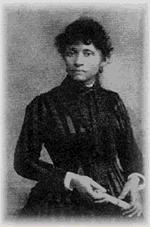

|
Lizzie Holmes No friend of the martyrs worked harder to keep their memory fresh than Lizzie Holmes, who made almost annual tributes to the men whose vision and comradeship continued to burn within her... Born in 1850 into a freethinking family, Lizzie Holmes moved to Chicago in 1877, after the death of her first husband, to learn more about the labor movement. She worked as a music teacher and as a seamstress; the latter employment led to her pioneering efforts in the Working Women's Union to organize sewing women and to publicize the wretched conditions they faced. At first a member of the Socialistic Labor Party, she turned to anarchism in 1883. Two years later she married the English born anarchist William Holmes. The Holmeses worked closely with Albert and Lucy Parsons in Chicago's American Group of the International Working People's Association. Lizzie served as assistant editor of The Alarm, and the day before the Haymarket meeting she led a march of 300-400 working women demanding the eight-hour day. When the authorities suppressed The Alarm Lizzie was one of those arrested; in 1887 Dyer D. Lum revived the paper and appointed Lizzie as associate editor. Tireless in support of the martyrs, she was also active in the Knights of Labor and helped form the Ladies' Federal Labor Union (1888) under the auspices of the AFL. In the mid-1890s William and Lizzie Holmes moved to Colorado, living in La Yeta, where Samuel Fielden was a neighbor, and in Denver. Still later they went to Farmington, New Mexico; there Lizzie died in 1926. Until about 1908 she contributed regularly to anarchist papers, especially Free Society, and wrote for a variety of labor journals, including The Industrial Advocate, edited by her husband, and the AFL's American Federationist. Her syndicated articles for the Associated Labor Press appeared in labor papers across the country. Throughout her life, Lizzie Holmes believed that women and workers could achieve justice only in a society built on the principles for which the anarchist martyrs had died. Source: Other Resources: |